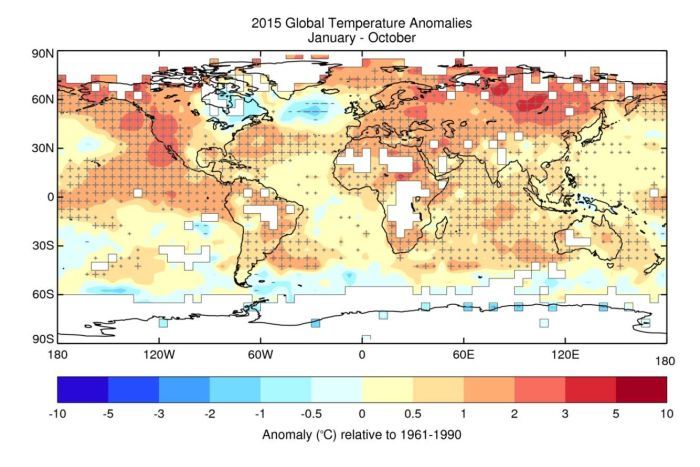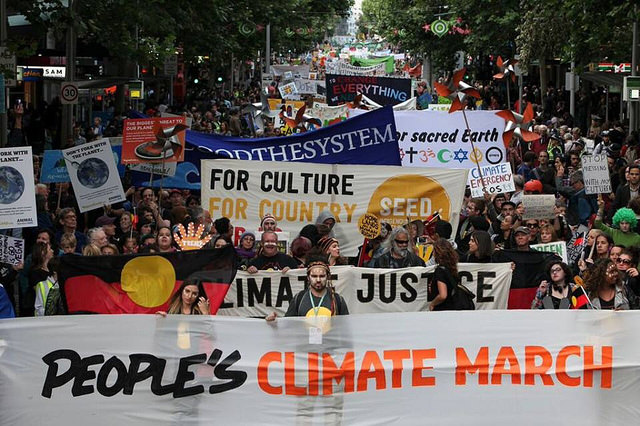By Imelda Visaya-Abano
PARIS, France – More than 140 of the world’s leaders are attending the United Nations climate change summit here at France’s capital city. Their goal: to come up with a new international climate change agreement to limit global temperature below 2 degrees Celsius and to avoid or minimize the adverse impacts of climate change.
Worldwide, there has been a growing momentum for action on climate change, especially in the lead-up to the 21st Conference of Parties (COP21) to the United Nations Framework Convention on Climate Change (UNFCCC) in Paris. It will, afterall, will be one of the biggest gatherings ever of world leaders.
After the failure at the 2009 Copenhagen climate summit, the French government vowed that all nations are prepared this time to engage and have stronger political will to sign a global climate deal in Paris.
The summit in 2009 failed to produce a treaty to replace the expiring Kyoto Protocol, countries, however, were asked for voluntary pledges to cut their emissions by specific amounts. To date, over 170 countries covering some 90 percent of emissions have made carbon-cutting pledges or the so-called Intended Nationally Determined Contributions (INDCs). According to the UNFCCC analysis, it fails to meet the objective of limiting a global temperature rise to less than 2 degrees Celsius. But the secretariat stated that it is a good start as it shows what the biggest polluters like the US, China, Europe and India are willing to commit to address climate change. Importantly, it will be a big push for climate ambition after Paris.
Today, Paris remains on high alert following the recent terrorist attacks where more than 130 people were killed. But French President Francois Hollande and top officials of the United Nations remained determined to push through with the summit that is indeed with a global importance. The capital city of France is gearing up for the security of more than 45,000 delegates, including the heads of state.
How important, indeed is the COP21? For UN Secretary General Ban Ki-moon, the summit in Paris “is not the end point” bur rather the “turning point towards a low-emission, climate-resilient future.”
He pointed out that the four essential elements for Paris to be a success are: durability, flexibility, solidarity and credibility.
“My message to world leaders is clear: success in Paris depends on you. Now is the time for common sense, compromise and consensus. It is time to look beyond national horizons and to put the common interest first. The people of the world – and generations to come – count on you to have the vision and courage to seize this historic moment,” the Secretary General said in a statement.
Even the French government observed that the mood of most of the negotiators is surprisingly hopeful, encouraging and positive as they outline the pillars for success at the Paris climate talks.
France’s Foreign Minister Lauren Fabius has laid down the essential elements as follows:
- A Paris alliance – to get a universal agreement to keep temperature rise below 1.5 or 2 degrees Celsius that must be differentiated, legally binding and sustainable.
- National contributions or the so-called Intended Nationally Determined Contributions (INDCs) of each country must deliver its commitment. So far, more than 170 countries have revealed their national climate action plans, including adaptation to climate change.
- Finance – Huge financial commitment from developed countries must be fulfilled under the Green Climate Fund with the agreed $100 billion a year by 2020 financing to help developing countries cope with climate impacts.
- Agenda for action – involving many cities, regions, companies and civil society to take commitment as well in addressing climate change.
But what remains to be the sticky issues in the negotiations?
The big tension, observers say, is between the developed and poorer nations. Three very big sticking points have to do with finance, responsibility and the discussion on “loss and damage.”
Financing to help poorer countries cope with climate change will dominate the negotiations in Paris. In 2009, rich countries pledged about $30 billion in “Fast-Start” financing over three years (2010-2012). In 2014, countries agreed to launch the Green Climate Fund that would set-up the $100 billion annual fund by 2020 to assist developing countries in climate mitigation and adaptation. According to the Organization for Economic Cooperation and Development, finance flows reached $62 billion in 2014, implying that they are on track toward the $100 billion goal. So far, pledges to the fund reached $10.2 billion. However, the agreement needs more clarity on what, how and when countries should communicate information on the finance aspect.
Albay Governor Joey Salceda, who sits as a former co-chair of the Green Climate Fund board, have assured countries that financing is available and can be accessed for countries from developing countries. He urged world leaders to come up with an agreement that would support mitigation and adaptation measures for vulnerable nations.
Responsibility will also be a hot topic at the Paris climate talks. Who is to blame for climate change? Poor nations argue that climate change fall on the shoulders of rich and industrialized countries, thus must bear most of the responsibility for mitigation. Rich nations on the other hand, said that climate change is a shared responsibility and needs a collective effort both from developed and developing countries.
Countries have been seeking to find common ground on the issue of climate impacts that goes beyond adaptation, known as “loss and damage.” It is a term coined in taking adaptation measures in advance of the climatic impacts due to the human-induced climate change. Such impacts are the disappearance of glaciers, rising seas, coral bleaching, and extreme weather events threatening low-lying nations. At the COP21, developing countries will again demand on the mechanism and for compensation and how to deal with inevitable loss and damage from climatic events.
So what is likely to happen at the COP21?
Experts say there will be a Paris climate deal for sure. It may be legally binding but that doesn’t necessarily mean each country’s emissions target is legally binding.
France, which will play a leading role in hosting the COP21, sought to build a Paris Climate Alliance based on four pillars. First, is to get a universal agreement to keep warming below 1.5 or 2 degrees Celsius. Second, is that countries must deliver its commitment through its national climate action plans or the INDCs. Third, a financial and technological aspect to guarantee the effectiveness and equity of the deal, and to make sure that they raise the $100 billion per year for climate financing by 2020. Fourth, mobilizing the whole economy and society involvement.
The outcome of the Paris climate talks is still to be written. More and more countries are now taking actions and even at the local level there has been the kind of popular pressure for leaders to act. Thanks to the rise of the climate justice movement all over the world who are also building up climate marches in Paris and in other parts of the world in the run up to the climate summit.
“ We will reach an agreement in Paris. We will have an agreement that is legally, but with different components and different nature of bindness,” UN climate chief Christiana Figueres said in a press conference, adding that countries have revealed their national climate action plans and developed countries were on track in reaching the $100 billion a year by 2020 goal for mitigation and adaptation projects.
Why should poor, vulnerable countries like the Philippines care about the climate talks?
Well, the fate of billions of people hangs in the balance as world leaders and government negotiators try to hammer out a new international climate change deal.
Science tells us that the warming of our planet was unequivocal, and it was extremely likely humans were to blame. If emissions of greenhouse gases continued, the world will likely to be at least 2 degrees Celsius warmer in many scenarios by the turn of the next century. There will be fiercer typhoons, longer drought periods, intense flooding and rising seas.
In fact, the World Meteorological Organization (WMO) said last week that 2015 is on track to be the hottest year, owing to a strong El Nino and warming planet.
That is why, the Philippine delegation led by Climate Change Commissioner Emmanuel de Guzman see the Philippines as an important player in the climate negotiations being the face of climate vulnerability. The country ha been experiencing fiercer typhoons, rising seas and longer droughts in the past few years. Not to mention, the 2013 Super Typhoon Haiyan heavily devastated the country, leaving more than 6,000 people dead and thousands of others homeless.
He also highlighted the Climate Vulnerable Forum (CVF) and the Vulnerable 20 (V20) Group of Finance Ministers’ efforts in pushing for more fund to assist poorer, vulnerable countries to adapt to climate change.
The Philippines as well is focusing on the human rights-based approach that could help protect the adaptive capacities of climate-vulnerable nations. “In Paris, the Philippines will focus on four crosscutting issues: equity, ambition, pre-2020 action and post-2020 financing. The Philippines views ambition in the post-2020 package as providing greater support to developing countries so that they can deliver effectively on their INDCs,” De Guzman said.
No other than Philippine President Benigno Aquino III will lead the adoption of the historic Manila- Paris Declaration on Monday in Paris. The declaration conveys what vulnerable countries want, commit and plan to accomplish to make the COP21 climate deal and follow-up a success.
Building on two years of consultations at regional and global level, the meeting will encourage other governments to endorse the CVF declaration. The Declaration, and its associated Road Map, spell out key priorities for the Paris agreement in terms of long-term temperature and mitigation goals, commitments of vulnerable countries and actions the group will work on in the years ahead.
Climate march: it is about our survival
Over the weekend, thousands of climate activists from various organizations marched to the streets worldwide calling for climate justice and to demand that climate negotiators produce a global, legally and just agreement by the end of the Paris summit.
In the Philippines alone, more than 2,000 people marched to clamor for climate justice. Thousands of other climate activists also held simultaneous activities in Australia, the Pacific Islands, Egypt, Japan, Bangladesh, South Africa, London, New York, Brazil and Mexico City. In Paris, climate activists formed a human chain in the popular streets of the city.
“ We are marching in the Philippines because it is about our survival – thousands of Filipinos have lost their lives because of climate change,” said Lidy Nacpil, Coordinator Asian Peoples’ Movement on Debt and Development.
At last, climate activists who embarked on a pilgrimage from Rome to Paris, already arrived at the Saint Merry Church in the city, joining hundreds of people in the human chain for climate justice. The People’s Pilgrimage was led by former Philippine Climate Change Commissioner Naderev ‘Yeb’ Sano.
“ The People’s Pilgrimage brings to Paris a message of hope, peace and love,” Sano said.
Indeed, we are hopeful that the political momentum showed by most countries in the past few years, with the optimistic view of the French government, a strong agreement will get us on a path that can lead us to unite and find solution to address climate change. A revolution is needed. All of us are counting on the world leaders to decide our climate future. Paris is the perfect opportunity to change climate change.
photo credit: UN; COP21.gouv.fr; 350.org; People’s Pilgrimage, Greenpeace, WMO, environews file






